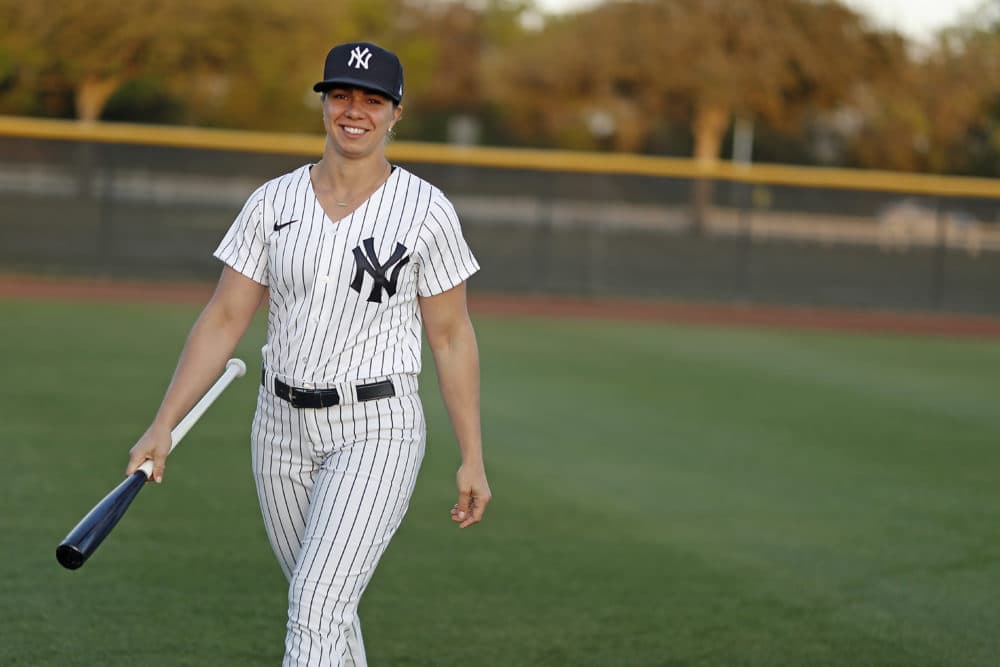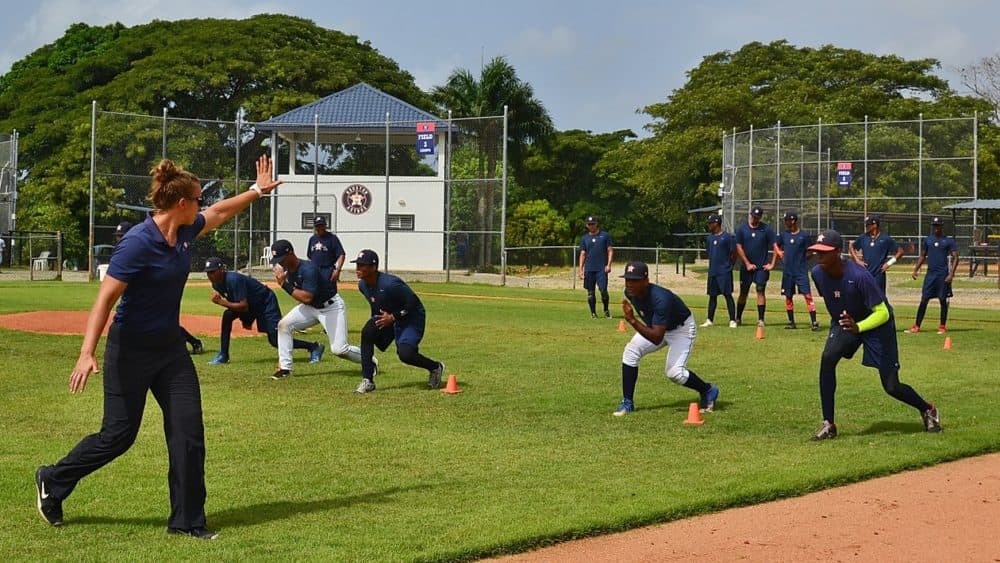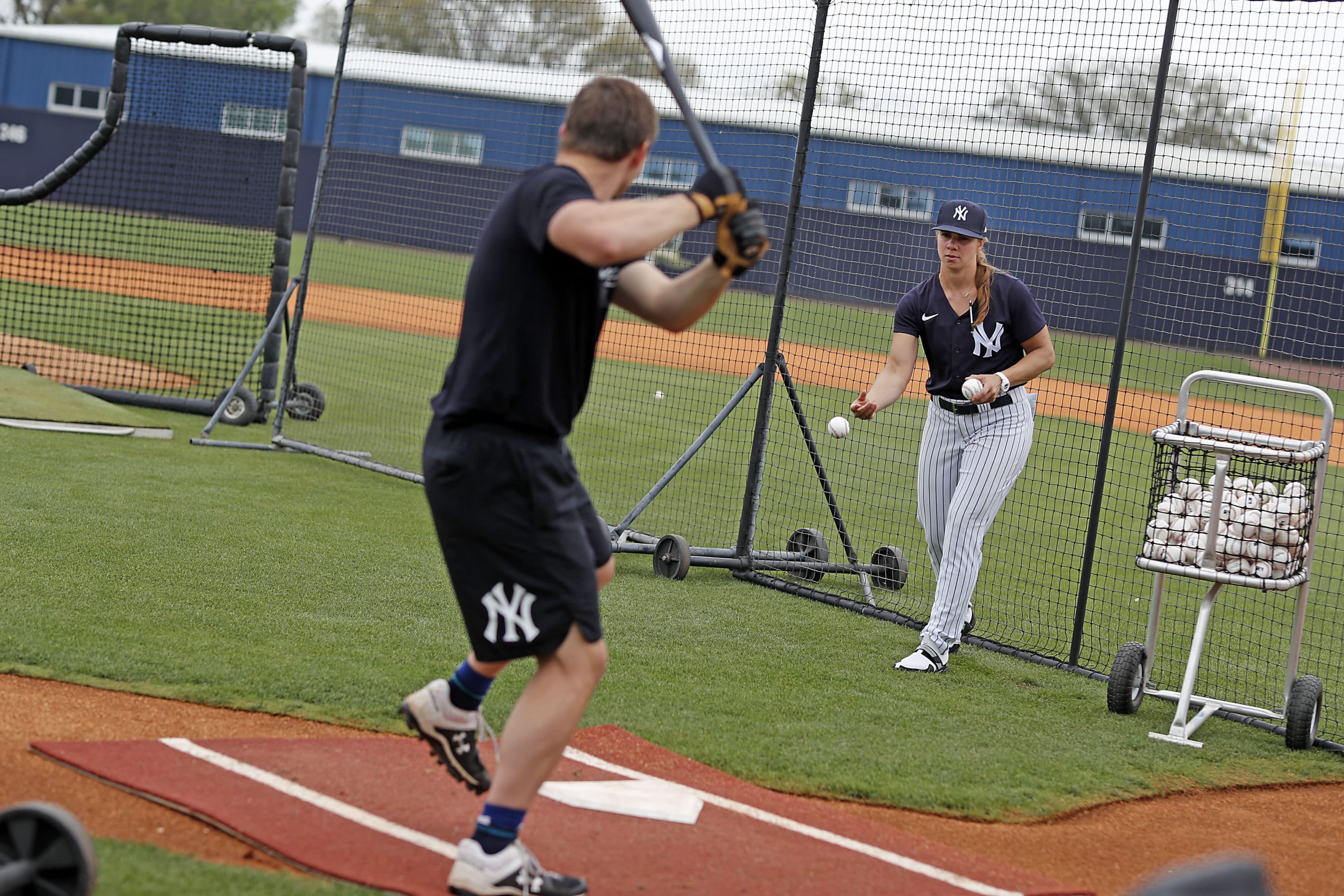Advertisement
How Rachel Balkovec Made Baseball History
Resume
Rachel Balkovec has been playing sports for as long as she can remember. She’s been coaching them forever, too. Or, at least since middle school.
"I was, like, the girl on the team that would tell everyone to show up early, and we would do conditioning before practice," Balkovec says with a chuckle. "The coaches in high school would give the postgame talk, and then, like, I would give a postgame talk on top of it."
It’s no surprise, then — to Balkovec, to her former teammates, to her high school coaches, to her family members — that she’s become the first woman to be hired as a hitting coach for a Major League organization.
But for the rest of the world, especially a lot of the sports world, it’s been a different story. It took them a little more time to come around. It’s something Balkovec had to get used to.
"It was a hard realization of, like, 'OK, if somebody doesn't want to hire me because of my gender, that's probably just not a human being that I want to be around anyway,' " Balkovec says.
Pursuing A Career In Baseball
Balkovec played softball in college, but that’s also when baseball entered her life in two different ways.
Her boyfriend was a pro prospect — drafted into the Dodgers’ minor league system. Meanwhile, Balkovec started a master’s degree program in kinesiology at Louisiana State University.
There, she worked as a strength and conditioning coach for the Division I sports teams at LSU, including the powerhouse baseball team, which was fresh off a national championship.
"So I was learning a lot there and kind of burgeoning my own career," Balkovec says. "But I was also just getting this wild fascination with the minor league system and the development of younger players, and how they enter the system and where they go."
After graduating from LSU, Balkovec got an internship with a low-level Cardinals minor league affiliate: the Rookie League Johnson City Cardinals.
"I went from 110% intensity to, like, not so intense, and very quiet [stadiums] and no fans," Balkovec says. "And I would say 95% of the players I was working with did not speak English and don't have any idea what SEC football or baseball or softball means. And they don't care."
Some of the players Balkovec worked with were as young as 18. Some came from college ball, but many had just left home in the Caribbean or South America.
"And so I showed up day one, and I ran — or I thought I was going to run — the stretch, just like I ran it at LSU. And that went horribly," Balkovec recalls. "There was no structure. There was no, like — and I would say something, and it’s like, I know they — this is not the first time they've done a lunge. They know what to do, but I'm a new coach, I'm a girl, and I don't speak Spanish, so they're going to take advantage of that, just like any smart teenager does."
So, Balkovec came up with a plan.
"I basically, the second day, showed up with all of the dynamic warmup phrases written down on a piece of paper, and I led the stretch in Spanish, and it went much better," she says. "Basically they kind of, I think, were like, 'Oh, dang. Like, we're going to have to actually listen to her.' "

Strength Coach Of The Year Who Couldn't Get A Job
Since that second day of training with the Cardinals, Balkovec has taught herself Spanish.
"I think it did help me, especially as a woman, to have something to relate to them," she says.
Balkovec was named the 2012 Appalachian League strength coach of the year.
So: She had a master’s degree. She had Spanish. She had worked with one of college baseball’s premier programs, and now she was strength coach of the year.
But when her internship ended, the Cardinals said they didn’t have a job for her.
Balkovec's next stop was Phoenix, where there are about 15 low-level minor league teams. In December, in anticipation of the upcoming season, she applied for open strength and conditioning positions at about 10 of them.
She heard back from none.
"He said, 'You know, I'd really like to hire you, but I'm not going to be able to. And it's because of your gender.' "
Rachel Balkovec
"And so I picked up a waitressing job and, about midway through spring training, I got a phone call from an organization, and they said that one of their guys had quit. And they were asking if I was still local, and I was still interested in the position," Balkovec recalls. "And I, of course, said, 'Yes,' interviewed a couple of times with their coordinator.
"He said, 'You know what? You're our girl. I really like you. You're phenomenal, overqualified for this job.' Like, 'We're lucky to have you. I'll call you in a couple of days. We'll get this process started with paperwork.' Well, I never heard from him."
Balkovec found that odd. She followed up. No response. Three weeks passed.
And, then, finally, she got a call. It was the same strength and conditioning coordinator.
"And he’s, like, really apologetic," Balkovec says, "but he said, 'You know, I'd really like to hire you, but I'm not going to be able to. And it's because of your gender. And I am horrified by this. I apologize.' He said he respects women. He wanted to hire me, but he couldn't do it. And he just wanted to be honest. And he was like, 'I want to let you know what you're up against.' "
Balkovec had two immediate reactions: One, she was surprised because that’s illegal. Two, she was actually grateful that he was honest with her, because now she knew the truth.
"And he was like, 'Well, um, it also gets worse,' " Balkovec recalls. "And I thought, 'How could this possibly get worse? Because you just told me that you discriminated against me.' And he said that he had taken so long to get back to me because he had called all of the other teams that he knew had open positions. And they said the same thing: that they had gotten my resume and that it just wasn't going to be possible because of my gender."
Balkovec was in disbelief. What more could she do? But, she says, she never considered taking legal action.
"Because I wouldn't be sitting here on this phone call if I had taken legal action. I wouldn't have a job," Balkovec explains.
"I think a lot of women understand that but harder for men to understand, like, 'Why wouldn’t you just sue them?' And it’s like, well, any person who’s been oppressed or discriminated against — and RBG, Ruth Bader Ginsburg, said this: You gotta be deaf sometimes, so that in the long run you can make a bigger impact.
"So I understood that I had an opportunity to open doors for other women. And, if I didn't do it, I wasn't sure of who else would come behind me. And I wasn't sure of when they would come."
'Rae' Balkovec
Balkovec says it didn’t even occur to her to stop trying. She actually just got more determined and more creative for the next round of applications.
"And I was on the phone with my sister and kind of discussing how I was going to apply for jobs," Balkovec recalls. "And she said, 'Well, why don't you change your name and see what happens?' And I was like, 'What do you mean?' And she said, ‘Change your name to a guy's name, and see if you get responses.' "
Balkovec did just that. On her next round of applications, she used the name "Rae Balkovec."
"And it worked," Balkovec says. "Really quickly I got a phone call from a number I didn't know. I was kind of out and about, and I just answered, not thinking too much of it. And he said, 'Can I speak to Rae?' And I was like, 'Uh...' You know, I just was like, 'Oh, my gosh, it worked!' So I said, 'This is she.' And he kinda like — there was like a shuffling of the papers on the other end, and he was like, 'Oh, I just wanted to make sure that you know I had the right name.'
"And I just thought, 'Well, there's only one way to say "Rae." You just were surprised that it's a woman.’ So I was like, ‘Well this really isn't a good time, but I'd love to — I'm really interested in this position. Can we talk tomorrow?’ He said, 'Yep, no problem. I'll call you tomorrow.' Never heard from him."
"He said, ‘Yep, no problem. I'll call you tomorrow.’ Never heard from him."
Rachel Balkovec
Balkovec followed up with a call and an email. Still nothing. Finally, she got an internship with a White Sox affiliate in Arizona. It paid $30 a day. Between that and her waitressing gig, Balkovec barely made enough for gas money. And when the internship was over, there was, once again, no full-time job waiting for her.
Balkovec figured she’d have to go another year without a legit baseball job. She was preparing to move to Boston, with no housing plans, to work unpaid in a facility there.
And then the Johnson City Cardinals, where she had won that strength coach of the year award, came calling with a full-time job offer.
It was the break Balkovec needed.
"I was pretty desperate," Balkovec says. "I was hired as the first-ever female strength and conditioning coach in the history of professional baseball, and definitely the first-ever coordinator. And then the next day I overdrafted my account because I was so broke."
But things were looking up. Balkovec was now responsible for overseeing 10 male strength coaches. And, over the next four years, she worked her way up in the minor league strength and conditioning ranks.
Climbing The Ranks
In 2016, Balkovec joined the Houston Astros organization, where she started working with several hitting coaches who also had backgrounds in kinesiology and strength and conditioning. She started thinking she could become a hitting coach, too. But this would be an even bigger leap for Balkovec — most hitting coaches are former players. Of the 30 that currently serve MLB teams, only two never played pro ball.
Just like when she had taught herself Spanish, Balkovec once again went way beyond what most would do to chase a new challenge. She spent a year and a half in the Netherlands getting another master's degree and training with some of the world’s top researchers in human movement science and eye-tracking for hitters. It put her on the cutting edge of the analytics work that more and more ballclubs are incorporating.
Soon after she returned to the States, she heard from a fellow Houston Astros alum, Dillon Lawson, who was now a hitting coordinator with the New York Yankees. Eventually, he offered her a job.
"I'd like to say it was just one day out of the blue, but it really wasn't. It was a continual conversation that developed over time," Balkovec says.

On Feb. 1, 2020, Rachel Balkovec became the first female hitting coach for a Major League affiliate when she started with the Gulf Coast League Yankees.
"I remember rolling into the parking lot of the complex, and I'm, like, walking past the building with the Yankees logo, and all of the championships listed. And a Yankees uniform is hanging in my locker," Balkovec recalls. "And, really, the thing that truthfully comes to mind is reflecting on, like, 'What would my grandmothers say about this?' "
Part of Balkovec's new job is pitching during batting practice. But having grown up playing softball, it hasn't been easy to adjust to throwing a baseball. Her players don't seem to mind.
"If I throw a strike, they're, like, cheering me on," Balkovec says. "They're like, ‘Yeah, that's right!’ You know, or like, I'll throw a strike, and a guy will take it, and they're like, 'What's wrong with you? Like, swing at that!' "
Life Without A Baseball Season
Balkovec and the team had about six weeks of training together before the coronavirus forced everyone to leave.
Currently, she’s staying at an Airbnb in Utah while she’s waiting to return to baseball. And she’s set up a GoFundMe campaign to help with COVID-19 relief. Balkovec adds $5 of her own money every day, and every week, she donates to a different cause: food banks, medical supplies.
"After we were sent home, I just kind of felt helpless, and I was like, ‘Wait, I'm not helpless. I can do something,' " Balkovec says.
So when Balkovec agrees to share her story with media outlets like Only A Game, she asks for a $10 donation to the GoFundMe in return. It’s an unusual arrangement, journalistically. But these are unusual times. Balkovec has raised about $5,000 so far.
And she’s been practicing her pitching during this downtime. At first, she was throwing against the fence at a nearby Little League field. But then, one day, Balkovec told her Airbnb host what she does for a living, and asked if she could throw batting practice for her host’s three baseball-playing sons.
"This mom was just, like, beside herself," Balkovec says. "She's like, 'Wait, I'm sorry. You coach for the Yankees, and you’re staying in my Airbnb apartment on the back of the house?' "
Imagine how she’ll react after hearing the rest of Rachel Balkovec’s story.
This segment aired on May 23, 2020.
